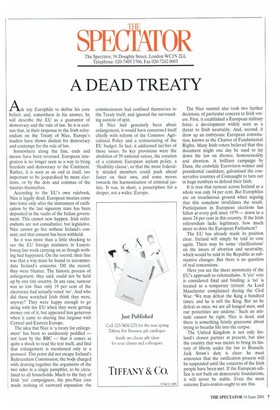SPECT E ATOR
The Spectator, 56 Doughty Street, London WC1N 2LL Telephone: 020-7405 1706; Fax 020-7242 0603
A DEAD TREATY
Ak any Europhile to define his core beliefs and, somewhere in his answer, he will describe the EU as a guarantor of democracy and the rule of law. So it is curious that, in their response to the Irish referendum on the Treaty of Nice, Europe's leaders have shown disdain for democracy and contempt for the rule of law.
Somewhere along the line, ends and means have been reversed. European integration is no longer seen as a way to bring freedom and democracy to the Continent. Rather, it is seen as an end in itself, too important to be jeopardised by mere elections, or by the dots and commas of the treaties themselves.
According to the EU's own rulebook, Nice is legally dead. European treaties come into force only after the instrument of ratification by the last signatory state has been deposited in the vaults of the Italian government. This cannot now happen. Irish referendums are not consultative, but legislative. Nice cannot go live without Ireland's consent; and that consent has been withheld.
So it was more than a little shocking to see the EU foreign ministers in Luxembourg last week carrying on as though nothing had happened. On the record, their line was that a way must be found to accommodate Ireland's concerns. Off the record, they were blunter. The historic process of enlargement, they said, could not be held up by one tiny country. In any case, turnout was so low than only 19 per cent of the electorate had actually voted 'no'. And who did these wretched Irish think they were, anyway? They were happy enough to go along with the EU when they were getting money out of it, but appeared less generous when it came to sharing that largesse with Central and Eastern Europe.
The idea that Nice is 'a treaty for enlargement' has been so assiduously peddled — not least by the BBC — that it comes as quite a shock to read the text itself, and find that enlargement is mentioned only in a protocol. This point did not escape Ireland's Referendum Commission, the body charged with drawing together the arguments of the two sides in a single pamphlet, to be circulated to all households. Much to the fury of Irish 'yes' campaigners, the pro-Nice case made nothing of eastward expansion: the commissioners had confined themselves to the Treaty itself, and ignored the surrounding aureole of spin.
If Nice had genuinely been about enlargement, it would have concerned itself chiefly with reform of the Common Agricultural Policy and a restructuring of the EU budget. In fact, it addressed neither of these issues. Its key provisions were the abolition of 39 national vetoes, the creation of a common European asylum policy, a 'flexibility clause', so that the more federally minded members could push ahead faster on their own, and some moves towards the harmonisation of criminal justice. It was, in short, a prescription for a deeper, not a wider. Europe.
The Nice summit also took two further decisions, of particular concern to Irish voters. First, it established a European military force: a development widely seen as a threat to Irish neutrality. And, second, it drew up an embryonic European constitution, known as the Charter of Fundamental Rights. Many Irish voters believed that this document might one day be used to lay down the law on divorce, homosexuality and abortion. A brilliant campaign by Dana, the erstwhile Eurovision winner and presidential candidate, galvanised the conservative counties of Connaught to turn out in huge numbers to defend their faith.
It is true that turnout across Ireland as a whole was only 34 per cent. But Europhiles are on treacherous ground when arguing that this somehow invalidates the result. Participation in European elections has fallen at every poll since 1979 — down to a mere 24 per cent in this country. If the Irish referendum lacks legitimacy, how much more so does the European Parliament?
The EU has already made its position clear. Ireland will simply be told to vote again. There may be some 'clarifications' on the issues of abortion and neutrality, which would be sold in the Republic as substantive changes. But there is no question of real concessions.
Here you see the sheer asymmetry of the EU's approach to referendums. A 'yes' vote is considered final and binding; a 'no' is treated as a temporary irritant. As Lord Manchester complained during the Civil War: `We may defeat the King a hundred times, and he is still the King. But an he defeat us once, we are all hanged men, and our posterities are undone.' Such an attitude cannot be right. Nice is dead, and there is something faintly gruesome about trying to breathe life into the corpse.
The United Kingdom is not only Ireland's closest partner at present, but also the country that was meant to bring its history of liberty under the law to Brussels. Jack Straw's duty is clear: he must announce that the ratification process will be suspended until the concerns of the Irish people have been met. If the European edifice is not built on democratic foundations, it will never be stable. Even the most extreme Euro-zealots ought to see this.


































































 Previous page
Previous page